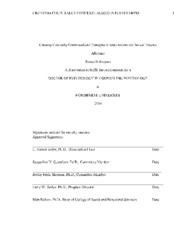Creating Culturally Contextualized Therapeutic Interventions for Sexual Trauma Aftercare
Abstract
Research about somatic trauma experiences provided ample evidence that the mind and body are intrinsically connected. Regarding my dissertation topic, this evidence also shows the Mind Body connection in sexual trauma which causes not only disease and injury but also dissociation, stress, shame, and the decreased ability to regulate emotionally or to retain a positive sense of self. This study endeavored to discover principles and practices that can lead to contextualized and democratized approaches to therapeutic interventions in cultural sexual trauma aftercare settings. Uniquely, this study proposed "movement arts therapy" as examples of such therapeutic intervention; the movement arts therapy took place in the Philippines in an aftercare facility with Filipino sexual trauma survivors. The goal in this intervention case study was to provide a framework of principles and practices that might also aid other helping professional fields and other cultural contexts, including community development and relief work. In November 2013, my movement arts workshops took place in a Filipino aftercare shelter in partnership with the Seattle-based nonprofit, Arts Aftercare. Starting at Samaritana Transformation Ministries in Manila, my team leaders and I introduced the first phase which involved training five aftercare staff members. The second phase allowed for the newly trained staff to replicate the workshop with fifteen female sexual trauma survivors ranging from ages eighteen to forty, all of whom were in a moderately stable condition.
Original item type
PDF
Original extent
180 pages
Collections
Copyright
This original work is protected by copyright. Copyright is retained by the author(s). Works may be viewed, downloaded, or printed, but not reproduced or distributed without author(s) permission.


 Maintained by the Northwest University Library
Maintained by the Northwest University Library